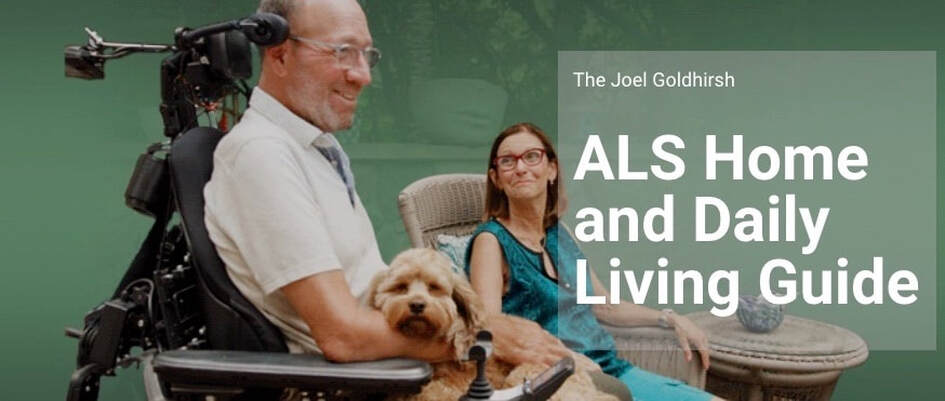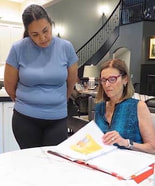ALS Caregivers |
|
|
Caring for a person living with ALS can be incredibly challenging, exhausting, and stressful. Though the main focus is usually on the person living with ALS, primary caregivers need and deserve support, too. Below you will find suggestions, services, and resources that will hopefully help you become a better caregiver and improve your quality of life.
|
|
Take Care of Yourself
|
No matter how much love and energy you have to give, you will need to find time to recharge and take care of your own physical, emotional, and psychological well-being. This is not selfish—and you should not feel guilty for doing it.
Finding support and taking breaks can help you avoid caregiver burnout and ultimately take better care of your loved one. Learn about self-care and how you can ask for help on our Caregiver Self-Care page. |
|
"There’s only so much you can do without taking respite and accepting support. As guilty as you feel, do it anyway. When you come back to your caregiver role, you’ll be refreshed, replenished, and a much better caregiver.”
- Laura, former ALS caregiver
- Laura, former ALS caregiver
Schedule Respite Care
It is important to realize that even if you are a strong and independent person, you will need breaks to recharge. ALS professionals recommend that family caregivers find and schedule respite care, which is any type of short-term caregiving assistance that provides rest and relief for you. Depending on your support network and the resources available in your community, you may be able to find respite care at no cost. Learn more on our Respite Care page.
Join a Caregiver Support Group
|
Caring for a person living with ALS can be an isolating experience. Yet there are thousands of other caregivers in similar situations who may be able to listen, relate, and share helpful tips and resources. Many local ALS organizations facilitate caregiver-only support groups at no cost that focus on your needs and challenges. Support groups may be held in person, virtually, or in a hybrid format. Learn more and search for support groups on our ALS Support Groups page.
|
|
Sign up for our free newsletter to stay up-to-date on new content, equipment, ALS news, resources, and more.
|
Attend an ALS Clinic
|
Attending a multidisciplinary ALS clinic once every few months is one of the most important things you and your loved one can do. Studies show that attending a clinic improves quality of life and can help your loved one live longer. During each visit, a team of ALS specialists will see your loved one individually to monitor progress, answer questions, and make recommendations.
|
|
Caregivers can request to speak separately with the social worker or other members of the team to discuss personal challenges. Between visits, you can call the clinic coordinator to ask questions as new challenges arise. Learn more about clinics and search for one near you on our ALS Clinics page.
Connect with Local Support Services
There are many nonprofit organizations across the country and around the world whose mission is to help you and your loved one navigate the road ahead. These organizations can usually answer your questions, connect you to resources, loan equipment, facilitate support groups, and more. You do not have to do this alone. There are knowledgeable and caring professionals who want to help. You can search for an ALS organization near you on our ALS Support Services page.
Visit Our Home and Daily Living Guide
This practical guide for ALS caregivers contains 90 video clips and addresses topics such as home accessibility, mobility, transferring, bathing, toileting, grooming, eating, sleeping, smart home technology, leisure, and more. It is by far our most comprehensive guide. We encourage you to explore our Home and Daily Living Guide and revisit specific pages as new challenges arise.
Guide for Paid CaregiversMany paid caregivers will have no ALS-specific training when they arrive at your home. To help improve quality of care, you can share our ALS Guide for Paid Caregivers with your caregivers.
|
Understand Your Care Options
|
|
There are a variety of care options that can support you and your loved one. Home health professionals can provide therapeutic services at your home with a doctor’s order. Caregivers can assist with daily activities like bathing, dressing, and eating. Palliative and hospice care professionals can provide helpful services toward the end of life. Learn more in our ALS Care section.
|
Newly Diagnosed GuideIf your loved one has been diagnosed recently with ALS, this guide will walk you through the most important things you need to know and do. Visit Guide
|
Prioritize Your Relationship
Your relationship with the person you are caring for can affect your quality of life. It is important to communicate your needs directly and listen to those of your loved one. If you continue to struggle and feel stuck in negative patterns, you may want to talk with the social worker at your ALS clinic or local ALS organization, or meet with a couples counselor to improve your dynamics.
|
|
|
Additional Resources
- Self-Care for Family Caregivers — Family Caregiver Alliance
- Caring Info — National Hospice and Palliative Care
- ALS Caregiving Toolkit — I AM ALS
- ALS and Caregiver Self-Care — Les Turner ALS Foundation
- This Is ALS — Facebook Group
- ALS Caregivers — Facebook Group
- Navigation and Peer Support Programs — I AM ALS
- VA Caregiver Support Program — For families of military veterans
- Care Connection — The ALS Association
- Lotsa Helping Hands — Online coordination calendar
- Caring Bridge — Community support coordination
- Meal Train — Meal giving organizer
We encourage you to continue exploring this website at your own pace. We have over 250 webpages and 300 videos. Hopefully we can help answer your questions, connect you to resources, save you money, expand your support network, and generally make life with ALS a little easier.
If you would like to receive content updates, tips, information, ALS news, and more, you can stay connected by signing up for our newsletter and following us on Facebook.
If you would like to receive content updates, tips, information, ALS news, and more, you can stay connected by signing up for our newsletter and following us on Facebook.







